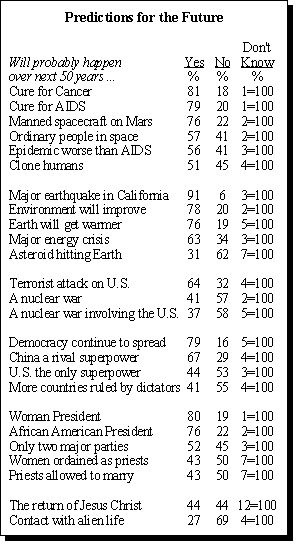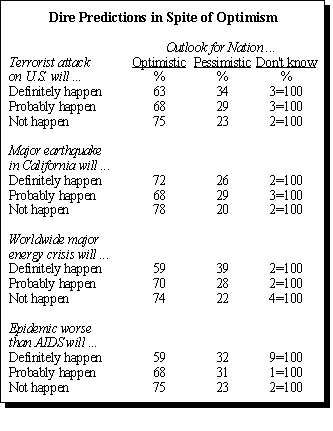When asked to predict the future, public confidence in science and technology is again evident. Eight-in-ten people say that cancer and AIDS will probably be cured; 23% and 19%, respectively, think that cures will definitely be found. Half of the public says scientists may be able to clone humans by the mid-21st century.

Those who are optimistic about the future of the U.S. place more faith in the power of science than do those who are pessimistic about America’s future. Better than eight-in-ten optimists say that cancer and AIDS will be cured in the next 50 years, compared to 68% and 70% of pessimists, respectively.
Thirty years after Neil Armstrong set foot on the moon, Americans are hopeful that we will soon take the next step. Three-quarters say a manned spacecraft could land on Mars in the next 50 years; 18% say it will definitely happen. Just over half of the public thinks that space travel may soon become a feature of everyday life — 57% say it’s likely that ordinary people will travel in space by 2050.
Predictions And Optimism
Interestingly, Americans tend to remain positive even when they expect to confront major perils such as terrorism, disease or an energy crisis. Thus, those who forecast grim events are likely to remain optimistic about their personal futures or the future of the U.S. For example, among those who say a terrorist attack on the U.S. will definitely occur, 63% are optimists; of those who believe such an attack won’t happen, 75% are optimists.
Similarly, of those who say an epidemic worse than AIDS will definitely sweep the globe, more than half (59%) are optimistic about America’s future.

However, optimists are more likely than average to endorse positive trends and less likely to agree with negative predictions. For example, roughly seven-in-ten optimists think that the education system will improve, but only half (51%) of national pessimists and 45% of those who are pessimistic about their own lives agree. Similarly, while just over half of optimists think the crime rate will go up, roughly three-quarters of pessimists say so.
This pattern does not always hold, however. For example, the belief that more babies will be born out of wedlock is shared by optimists and pessimists. And, the consensus about the growing division of wealth in society extends to both groups: At least two-thirds in each says that the gap between the rich and poor will grow.




